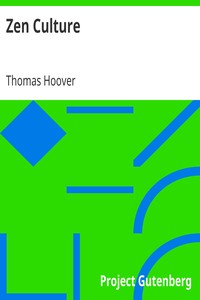Zen Culture by Thomas Hoover
"Zen Culture" by Thomas Hoover is a nonfiction exploration of Zen aesthetics and its influence on various aspects of Japanese art and culture, written in the late 20th century. The book delves into how Zen principles permeate not just traditional art forms but also contemporary design, architecture, and even everyday life, suggesting a seamless connection between the historical and the modern. Hoover investigates Zen's emphasis on direct experience over intellectual analysis, positioning
it within the broader spectrum of Japanese thought and culture. At the start of the work, Hoover presents an observation that the Zen arts exhibit striking modernity and a timeless quality, asserting their relevance to contemporary aesthetics. He elaborates on this by discussing how Zen ceramics, calligraphy, architecture, and performance art resonate with modern artistic movements, noting parallels with abstract expressionism and minimalism. The opening section also introduces the notion of 'direct perception' as a key element of Zen, proposing that through the lens of Zen, one can rediscover beauty in simplicity and imperfection in both art and daily activities. (This is an automatically generated summary.)
Read or download for free
| How to read | Url | Size | |||
|---|---|---|---|---|---|
| Read now! | https://www.gutenberg.org/ebooks/34324.html.images | 661 kB | |||
| EPUB3 (E-readers incl. Send-to-Kindle) | https://www.gutenberg.org/ebooks/34324.epub3.images | 487 kB | |||
| EPUB (older E-readers) | https://www.gutenberg.org/ebooks/34324.epub.images | 495 kB | |||
| https://www.gutenberg.org/files/34324/34324-pdf.pdf | 3.2 MB | ||||
| MS Word Document | https://www.gutenberg.org/files/34324/34324-doc.doc | 8.6 MB | |||
| EPUB (no images, older E-readers) | https://www.gutenberg.org/ebooks/34324.epub.noimages | 257 kB | |||
| Kindle | https://www.gutenberg.org/ebooks/34324.kf8.images | 696 kB | |||
| older Kindles | https://www.gutenberg.org/ebooks/34324.kindle.images | 655 kB | |||
| Plain Text UTF-8 | https://www.gutenberg.org/ebooks/34324.txt.utf-8 | 437 kB | |||
| Download HTML (zip) | https://www.gutenberg.org/cache/epub/34324/pg34324-h.zip | 477 kB | |||
| There may be more files related to this item. | |||||
Similar Books
About this eBook
| Author | Hoover, Thomas, 1941- |
|---|---|
| LoC No. | 76050559 |
| Title | Zen Culture |
| Credits | Produced by Al Haines |
| Reading Level | Reading ease score: 57.6 (10th to 12th grade). Somewhat difficult to read. |
| Language | English |
| LoC Class | DS: History: General and Eastern Hemisphere: Asia |
| Subject | Japan -- Civilization -- Zen influences |
| Category | Text |
| EBook-No. | 34324 |
| Release Date | Nov 14, 2010 |
| Copyright Status | Copyrighted. Read the copyright notice inside this book for details. |
| Downloads | 546 downloads in the last 30 days. |
| Project Gutenberg eBooks are always free! | |

